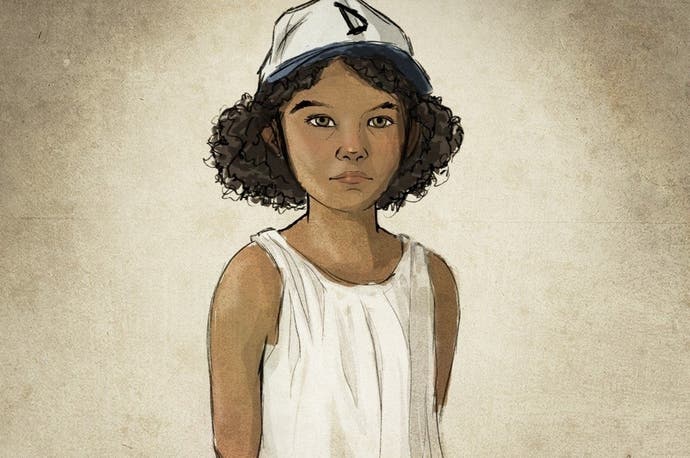Telltale nearly scrapped The Walking Dead's Clementine a week before recording
Also: the writers on why more people didn't save Doug. It's not what you think.
Telltale writers Jake Rodkin and Sean Vanaman revealed at a Game Developers Conference panel attended by Eurogamer that Clementine was nearly cut from The Walking Dead a week before voice-recording took place.
THERE MAY BE SPOILERS AHEAD.
The pair explained that one of the greatest challenges about writing The Walking Dead was to make sure the supporting characters were likable and empathetic enough that people wouldn't want to leave them.
"We tried to answer this one question: Why would you not leave this group of assholes?" said Rodkin. "If you don't care about that child then we're doubly screwed, because you'd be frustrated by this group and you'd be shackled to this little kid you don't care about. Was there talk about leaving Clementine out of the game a week before voice recording? Yes. Yes there was."
This isn't that surprising given how many children in games are incredibly obnoxious. "We learned that characters in the Walking Dead need to a) be capable, and b) be capable of eliciting an empathetic response from the player," said Rodkin.
The pair noted that the character Larry doesn't say or do a single nice thing to Lee, but players often empathised with him anyway. Some players would take the low ground and retaliate with cruel digs and actions, others found Larry's behaviour made them want to try harder to be liked by him, while some would navigate each social situation based on what made sense at the time.
Shockingly, in Episode 2, where players are asked which four characters they'll feed, 42 per cent chose Larry, placing him as the fourth choice overall. To put this in perspective, 96 per cent fed Clementine, 95 chose Duck, and 58 per cent chose Mark, a new character. Thus, more people chose Larry than any of the other adults from Episode 1.
Elsewhere during the panel, the pair described how they thought they failed at making the 'save Carley or Doug' choice as difficult as it should have been, resulting in 75 per cent of players choosing to save Carley.
Most assume this was due to Carley being a hot girl with a gun while Doug is a shlubby dude whose primary skill is that he knows how to reprogram universal remotes. In actuality, the writers realised this was due to Carley sharing far more meaningful interactions with Lee. She knows his secret, yet trusts him enough to keep it, they both encounter the bit woman at the hotel and discuss the aftermath of that event, and she saves Duck earlier on. Comparatively, your only real interaction with Doug is when you recruit him to help with the diversion puzzle. You then lie to him about your brother's identity. Thus, more people didn't save Doug because they didn't know him.
"We have one character, Carley, whose entire story with the player is about building trust, confession and reflection. The other, Doug, is has moments of problem solving, but is otherwise brief and concentrated on hiding who you are, keeping at arms reach and protecting yourself," said Rodkin. "So regardless of who they are as people, Doug and Carley's opportunities for context building are completely out of balance. Looking back, we never really gave the player even a chance to learn who Doug was as a character."
The writers also finally addressed Lee's race. "Lee's race was informed by what we believe to be the social facts of the region for the American South East," said Vanaman.
The pair noted that Lee's race mattered even though it's not central to the game's theme. "When you make choices about who the characters are then yes, you are defining the context for your game, but you're not defining the thematic thrust of the game," Vanaman continued. "The theme is not about race, but it has to feature the politics of race in the game context in order to be honest."
"Race is a game design choice you make as a designer," said Vanaman. "We stripped out so many mechanics that every choice about who these characters were made a bigger impact on the game than they normally would."
"The sort of things we would say in response to a sticky situation or even a subtly racist remark are defining not just the colour of his skin, but also the life experiences he's had we're asking you to share with him. And you're going to define more of these experience for him thus creating an even broader context for the decisions that you make in these situations. So the game is asking you to carry Lee's personal experience with you along with the experience you're going to go on from that point."

